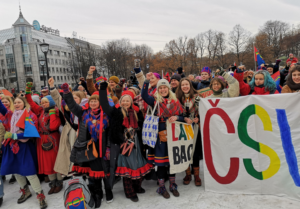
We have known for decades now that we must end the disastrous dirty oil age and transition to clean, renewable energy. The wording often used by scientists and activists is that we need a “just transition.”
There is where society enables an equitable transition from polluting, undemocratic fossil fuel industries to cleaner community-led renewable technologies.
Such a transition must be fair and inclusive to workers and local communities. It has to be equitable. You cannot replace one undemocratic industry with another imposed undemocratic technology. That is not a climate solution. It is not just.
In 2013, the Norwegian Government granted two massive concessions to build 151 wind turbines in the Fosen area in Trøndelag, in the midwest of the country. The wind farms, which are one of Europe’s largest wind developments, started production in 2019. However, in giving the go-ahead to the USD 1 billion development, the government ignored that the turbines were on the land of the indigenous Sámi people, who use it for grazing their reindeer, a source of food, clothing, and labor.
With the construction of the turbines, the Sámi, whose culture and customs the Norwegian government has long overlooked, could not use the area for reindeer herding. The Sámi challenged the wind turbine development in court.
In a significant rebuke to the Norwegian government, in October 2021, the Supreme Court declared that the government had violated the Sámi reindeer herders’ rights, as follows by Article 27 ICCPR. The provision sets out that persons belonging to an ethnic, religious or linguistic minority shall not be denied the right, in community with the other members of their group, to enjoy their own culture. The supreme court ruled the license as invalid.
As one Norwegian blogger who has worked on indigenous rights for many years notes, this could have been avoided if the Government had consulted the Sámi in the first place. They write, “any project potentially affecting indigenous communities should always be preceded by a Free, Prior and Informed Consent process before any concession granted on territories where there are indigenous activities…This is an international practice recognised by the UN and used in numerous countries as best practice to prevent such conflict as it has now appeared in Norway in the Fosen area between the State, the companies and Sámi communities.”
For 500 days, the Norwegian government ignored the Supreme Court ruling and refused to take down the wind turbines. For months, activists representing the Sámi community have called for the wind turbines to be demolished, accusing the Government of “putting profit over Indigenous rights.”
And last month, Indigenous and climate activists started occupying the Offices of the Ministry of Energy and Oil. The protests quickly spread and gained international attention. The predominantly young activists were led by the famous Sámi singer, Ella Marie Hætta Isaksen, who said, “We are here to demand that the turbines must be torn down and that legal rights must be respected.”
In a show of solidarity, Swedish climate activist Greta Thunberg joined the protests, too. “Indigenous rights, human rights, must go hand-in-hand with climate protection and climate action. That can’t happen at the expense of some people. Then it is not climate justice,” Thunberg told Reuters, one of the many international news outlets to cover the story, along with Sky News, Washington Post and Le Monde.
Once again, the Sami and young activists’ actions show that people power works. Their protests forced the Norwegian Government to go from indifference and arrogance when the protests started, to issuing a formal apology. The Norwegian Prime Minister, Jonas Gahr Støre, finally met with the Sámi, conceding there were “ongoing human rights violations” for the Sámi. He also apologized.
An apology is not enough, though. The wind turbines and the cultural violation still stand. The Norwegian Government has to listen to the concerns of the Sámi. A just transition to wind energy cannot mean violating Indigenous rights. All rights have to be respected. Otherwise, we are just repeating the injustices of old. And all governments transitioning from fossil fuels, especially Norway’s Scandinavian neighbors, must also learn the lessons of the Fosen wind turbine saga. The message is simple, First Nations need to come first.
My Norwegian colleague, Silje Ask Lundberg, a Senior Campaigner on North Sea oil and gas, reflects on what the protests mean to the Sámi in Norway. Lundberg says, “to see young Sámi activists, being carried away in our traditional gákti, that were turned inside-out (a traditional Sámi way of showing resistance) with hundreds of people surrounding them chanting CSV – show sámi spirit – and with the traditional luohti – joik – being sung as they were carried away, made such a deep and staggering impression.”
She adds that the wind farm saga shows “how bad a green transition can go, if first nation rights are ignored. That is also why it’s so important to both say and to show that without justice – there is nothing.”

